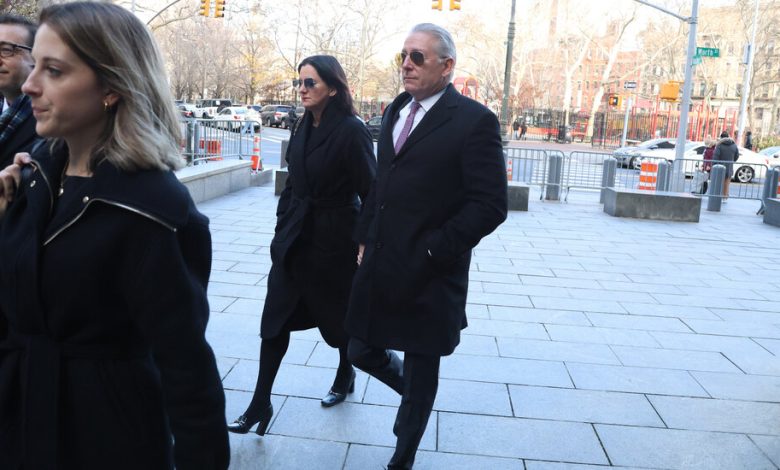Former F.B.I. Spy Hunter Sentenced to 4 Years in Prison

A federal judge in Manhattan sentenced a former top F.B.I. agent to more than four years in prison on Thursday for conspiring to launder money and violate U.S. sanctions intended to punish a Russian oligarch with ties to President Vladimir V. Putin.
The agent, Charles F. McGonigal, had served as chief of counterintelligence for the Federal Bureau of Investigation in New York, a crucial and sensitive position inside the American intelligence community, before retiring in 2018.
In January of this year, however, Mr. McGonigal’s reputation as a spy hunter was upended when he was arrested by federal agents and two indictments were unsealed in New York and Washington, D.C., charging him with taking money from some of the very same types of people whom he had been assigned to monitor, according to prosecutors.
Both indictments have since resulted in guilty pleas, making Mr. McGonigal one of the highest-ranking F.B.I. officials ever to be convicted of a crime.
In New York, Mr. McGonigal, 55, admitted last summer to working on behalf of Oleg V. Deripaska, a Russian aluminum magnate, in violation of sanctions imposed on him in 2018.
And on Thursday, Mr. McGonigal — an expert in Russian counterintelligence who seemingly lived a commonplace suburban life in Maryland — was confronted with a looming new reality and living arrangement: a federal prison, the result of a 50-month term handed down by Judge Jennifer H. Rearden of Federal District Court. Mr. McGonigal was also fined $40,000.
Addressing the defendant, Judge Rearden said her sentence was meant to balance Mr. McGonigal’s more than two decades as a law enforcement officer with the “extremely serious” nature of his crimes, which she said had imperiled national security.
The judge added that while Mr. McGonigal may not have intended to undercut the legitimacy of the sanctions that were critical to efforts to punish Russia, “that is precisely what he ended up doing.”
For his part, Mr. McGonigal said that he profoundly regretted his actions, which he said had shattered his life and career.
“I stand before you with a deep sense of remorse,” Mr. McGonigal said to Judge Rearden, sounding weary. He added: “I am humbly asking for a second chance.”
Before that happens, however, Mr. McGonigal will face a second sentencing: In September, he also pleaded guilty in federal court in Washington, where he was charged with hiding $225,000 in payments he had received from a former Albanian intelligence officer, along with overseas travel, meetings with foreign nationals and other dealings. He is due to be sentenced in that case in February.
According to sentencing documents submitted by Damian Williams, the U.S. attorney for the Southern District of New York, Mr. McGonigal had been planning on exploiting his position for monetary gain even before he stepped down from the F.B.I.
That plan came to fruition in 2021, when Mr. McGonigal agreed to investigate a competitor of Mr. Deripaska — Vladimir Potanin, another Russian oligarch — in exchange for hidden payments. Those illicit services were arranged through a representative of Mr. Deripaska, Yevgeny Fokin.
Mr. McGonigal’s relationship with Mr. Fokin included favors like pursuing an internship for Mr. Fokin’s daughter at the New York Police Department, where she received “V.I.P. treatment,” according to Mr. Williams.
Mr. McGonigal’s work on the oligarch’s behalf — obscured by use of shell companies and subcontractors — involved seeking information about Mr. Potanin’s business. The ultimate goal, prosecutors said, was to cause sanctions to be placed on Mr. Potanin, potentially leveling the playing field with Mr. Deripaska. But the plot unraveled within months, after the F.B.I. seized Mr. McGonigal’s cellphone and that of another associate, Sergey Shestakov.
The unfortunate irony of a lawman becoming a lawbreaker seemed to gall Mr. Williams.
“It is not an overstatement to say that no one knew better the gravity of McGonigal’s crimes than McGonigal himself,” the U.S. attorney wrote.
Hagan Scotten, a prosecutor on the case, echoed that sentiment in court on Thursday, saying that Mr. McGonigal’s role as chief of counterintelligence for the F.B.I. in New York was “one of the most important” anti-spying jobs in the nation, considering the city’s position as an international hub.
“It should have been the crowning achievement in his F.B.I. career,” Mr. Scotten said. Instead, he said, Mr. McGonigal “was not content to serve only the country that entrusted him.”
Seth DuCharme, a lawyer for Mr. McGonigal, had asked for a noncustodial sentence, arguing that his client’s actual actions were not as nefarious as the government had implied, though undeniably criminal.
“There’s a great concern for what Charlie could have done,” he said, adding, “but I think we have to stay focused on what he actually did.”
Still, Mr. DuCharme — a former acting U.S. attorney — conceded that the former agent had made a “terrible decision,” saying that “no one knows better than Charlie McGonigal” how his conviction had tarnished his years of public service.
“Charlie,” he said, “still loves the F.B.I.”
Michael Rothfeld contributed reporting.



